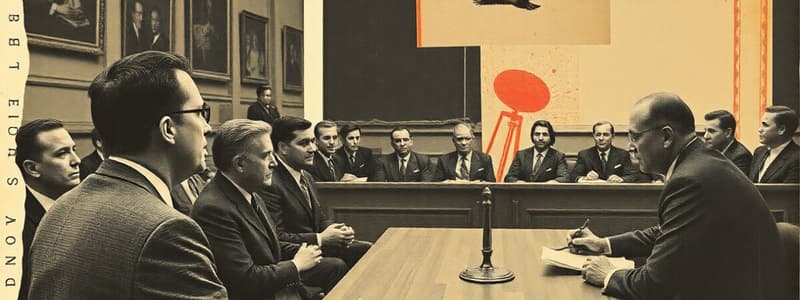Podcast
Questions and Answers
What is the primary purpose of testimony in a court setting?
What is the primary purpose of testimony in a court setting?
- To offer information and answers sworn as truthful. (correct)
- To share personal opinions about the case.
- To serve as a marketing tool for products.
- To provide physical evidence to the court.
How is testimony different from a testimonial?
How is testimony different from a testimonial?
- Testimony is given under oath, while testimonials are not. (correct)
- Testimony is always written, whereas testimonials are usually oral.
- Testimony can include opinions, but testimonials cannot.
- Testimony is used for marketing, while testimonials are legal statements.
What type of statements does testimony primarily consist of?
What type of statements does testimony primarily consist of?
- Speculative opinions regarding events.
- General impressions of products or services.
- Fact-based accounts of actual occurrences. (correct)
- Assumptions made about someone's character.
What constitutes a serious crime when giving testimony?
What constitutes a serious crime when giving testimony?
Under what circumstance can expert witnesses give testimony that may include opinions?
Under what circumstance can expert witnesses give testimony that may include opinions?
Flashcards
What is testimony?
What is testimony?
Information given by a witness to the court, under oath, about facts of a case.
What is oral testimony?
What is oral testimony?
Testimony that is given orally, rather than in writing.
What is written testimony?
What is written testimony?
Testimony that is given in writing, rather than orally.
What is expert testimony?
What is expert testimony?
Signup and view all the flashcards
Why is lying in court a serious crime?
Why is lying in court a serious crime?
Signup and view all the flashcards
Study Notes
Witness Testimony
- Witness testimony is information provided by a witness to a court.
- It's a form of evidence, similar to physical objects.
- Testimony relies on the witness's oath to accuracy and truthfulness.
- Can be oral or written.
- Primarily statements of fact, not opinions (except for expert witness testimony).
- False testimony is perjury, a serious crime.
Testimony vs. Testimonials
- Testimony is legal, about facts occurring.
- Testimonials are marketing statements.
- Testimonials are almost always opinions, not sworn statements.
- Testifying under oath makes witnesses more accountable than those giving testimonials.
Studying That Suits You
Use AI to generate personalized quizzes and flashcards to suit your learning preferences.




